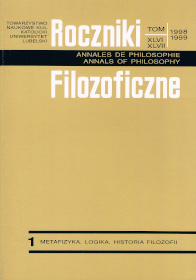Anaxagoras: Mind and the World
Abstract
The paper discusses Anaxagoras’ concept of Mind, its attributes, and its relation to the world.
Mind is infinite, autonomous, free from any admixture, independent, omniscient, and powerful. Mind is a cause of order in the world by imposing this order on the primordial mixture of substances, attributes, and seeds. It appears that life is the order of a higher level than the order of inanimate nature, but life requires a constant control of Mind for its proper functioning. On the other hand, in inanimate nature, the first impulse given the primordial mixture by Mind was sufficient to release the mechanic laws responsible for all future changes of mixture’s parts.
Soul in living beings and Mind are different substances: soul is life ’s material principle, Mind is its rational, extramaterial principle. Soul is a substance which was a part of the primordial mixture. However, this does not make every part of matter alive. To be alive, soul has to be organized in a certain way, which is the work of Mind. Mind is not alive in the same sense as material animate beings are, but this does not place Mind on the same level as material inanimate beings. Mind is different than everything in the world, including life. Mind is the principle of order in the world, and life is a part of this order. Mind is not inanimate, but it is not alive either in the sense of possessing a soul. It is a living being, i.e., active, but its separation from everything, including life, makes this activity possible. Cognitive processes of living beings are limited to perception, including some reasoning abilities. Mind is the only being endowed with rationality as a cognitive faculty. This vision of Mind, which brings Anaxagoras closer to monotheism of Judaism and Christianity than to polytheism of the Greeks, might have been a reason for accusing him of lack of respect for the gods. Matter is devoid of power since activity as such, in the form of pure rationality, cannot be found in it. Anaxagoras separates the principle of order and rationality from the world and places it in the being of different nature than the world. In this, he reaches a higher level of abstraction than his predecessors and opens in philosophy the way to analyze rationality in separation from its substrate. In theology, Anaxagoras begins the analysis of the being that is the principle of order in the world, which later also becomes the principle of existence of nature.
Copyright (c) 1999 Roczniki Filozoficzne

This work is licensed under a Creative Commons Attribution-NonCommercial-NoDerivatives 4.0 International License.





